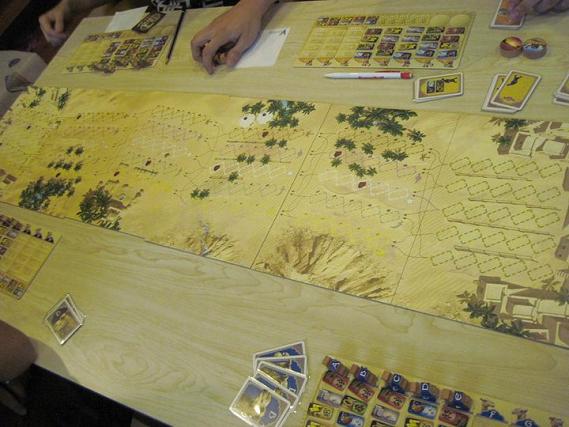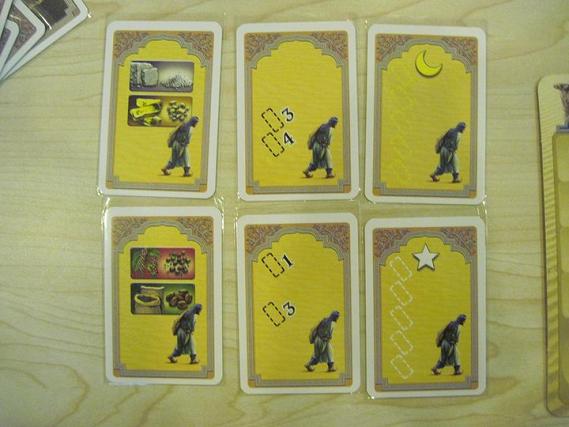
I only realized after playing Timbuktu (I’m not even going to try to reproduce the weird spelling of the actual edition we used) that I haven’t played that many deduction games. Shan and I played a few games of Mr. Jack back when we first discovered Sean’s shop and I guess Fury of Dracula which we played with Han has some deduction elements, but I can’t think of anything else. I’ve never played the classics of the genre, such as Scotland Yard or even the popular Cluedo.
Timbuktu is a bit different in that it doesn’t use the crime-solving / villain-chasing theme that fits deduction-based mechanics so well. But since the point is to avoid having your goods stolen by thieves along the way, I suppose it ends up being pretty much the same thing. My thoughts:
- The very definition of analysis paralysis. It’s one thing to make decisions based on the cards you’ve seen. It’s another to infer additional information from what you see other players doing. I drew the line at looking at other players’ mats. In theory, you could look at them to see if a player made a move because a space is safe or because that player has no goods that are threatened by being in that space, but that was way too much work for me.
- Sean asked us to take into account the different values of the goods when deciding what, if anything, to sacrifice. But it doesn’t matter for most of the game. Maybe you can try to work in this information in the very last round. In the earlier rounds, you simply do whatever you can to keep as many goods as possible.
- We played the normal version in which the configuration of goods for each player is fixed according to the mat he gets. Interestingly, even this setup is different for each player. Apparently in the advanced version, you can set up your goods anyway you want, which must be painfully tense because you have to decide in advance just how much risk you want to take.
- If everyone is just as assiduous about analyzing every bit of information available, then luck plays a part because at some point everyone has to take a chance based on incomplete information. Given how many points a single good is worth at the end of the game, a single mistake can make all the difference.
- I didn’t really take account of the different paths through the various boards. This resulted in my camels being congested at certain paths and forced me to spend goods to move them to somewhere with a free space. I had too much to worry about to take this factor into account. I wonder if the other players took more note of this?
- I think I still like the more traditional version of deduction. Here, you’re forced to make a decision every round, whether you have enough information to make a safe decision or not. In the traditional format, the trade-off is between time and risk. Do you take a risk and make a move based on incomplete information or take the time to gather more information at the risk of falling behind?
My conclusion: clever game conceit and good use of the deduction mechanic, but probably still too much work for me to really feel like much fun. I can’t imagine playing it without the ability to take notes. It would be total and extremely frustrating chaos.

One Response to “Timbuktu”
Yeah! That’s one of our house rules, no pen and paper allow on the table. Heheheheh…
Leave a Reply